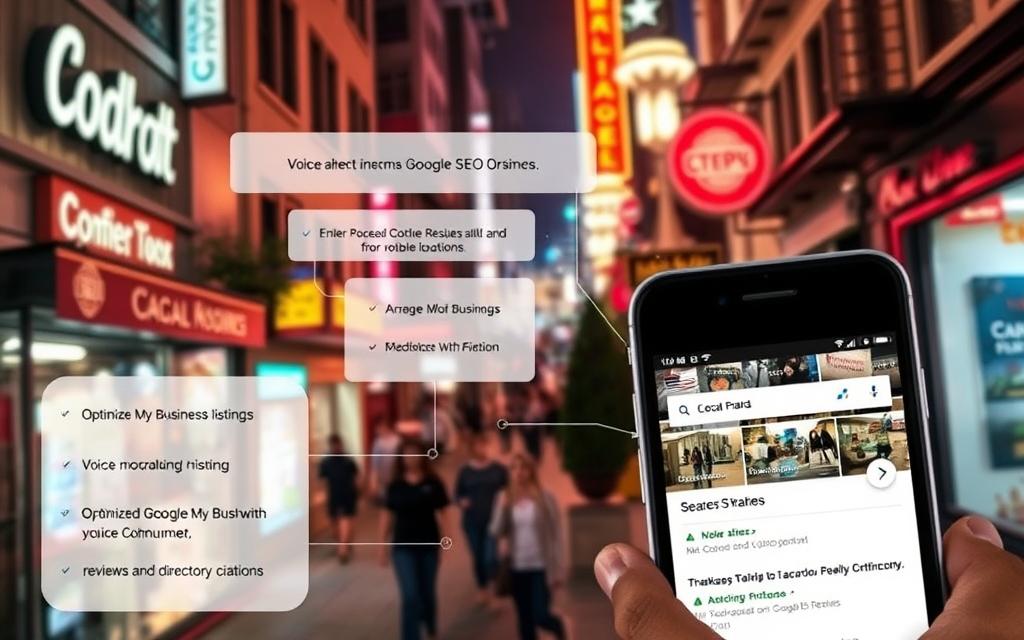Local SEO for Voice Search Guide
In 2025, making your business ready for voice search is key. Voice search is changing how we talk to search engines. Are you ready to use this trend to your advantage?
Local SEO for Voice Search is now a must. It helps you stay ahead and reach more people. How can you make sure your business shows up in voice search?
Exploring voice search will show you why it’s vital for local businesses. By the end of this, you’ll know how to make your online presence shine. You’ll be ready to thrive in the voice search world with Local SEO for Voice Search.
Local SEO Takeaways
- Understand the importance of voice search optimization for local businesses
- Discover how to optimize your online presence for voice search
- Learn how to stay ahead of the competition in the voice search landscape
- Find out how to capitalize on the growing trend of voice search
- Gain insights into the future of local business SEO
The Revolution of Voice Search and Local SEO
Voice assistants are changing how we search online. This change is big for businesses that want to be seen. Voice search is leading this change.
Understanding the Voice Search Landscape
Voice search tech has gotten better. Now, we can ask questions like we talk. It’s fast and easy, so people use it a lot. Optimizing for voice search means using natural language and long-tail keywords.

Impact on Local Business Discovery
Voice search changes how we find local businesses. With “near me” searches, being found online is key. Make sure your Google My Business listing is up to date. Local SEO strategies need to think about voice search now.
Current Voice Search Statistics and Trends
There’s a lot of data on voice search. It shows a big part of people use voice assistants. Knowing these stats helps make good voice search optimization plans.
| Statistic | Value | Trend |
|---|---|---|
| Voice Search Users | 55% of households | Increasing |
| Daily Voice Searches | 1 billion+ | Stable Growth |
| Local Voice Searches | 46% of users | Rising |
Why Your Local Business Can’t Ignore Voice Search Optimization
Voice search optimization is now a must for local businesses. Most people use voice assistants to find local info. Local SEO tips for 2025 highlight voice search’s key role in staying ahead.
People are changing how they search for local businesses. They use voice commands to find services, restaurants, or stores nearby. So, your local business needs to be voice search-friendly to stay seen.

Let’s look at the good things about voice search optimization for local businesses:
| Benefit | Description | Impact |
|---|---|---|
| Increased Visibility | Appear in voice search results | More customers find your business |
| Improved Local SEO | Optimized for conversational keywords | Better search engine rankings |
| Enhanced User Experience | Voice-friendly business listings | Higher customer satisfaction |
To start with voice search optimization, focus on natural language processing (NLP) integration and mobile-first indexing requirements. Make sure your website works well on mobile. Also, make your content easy to understand for voice searches.
By focusing on voice search optimization, you’ll draw more local customers. Don’t overlook the power of voice search – it’s vital for your online success.
Essential Components of Local SEO for Voice Search
To get your local business seen in voice search, you need to do a few things. You must focus on what makes your business special in voice search results.
Natural Language Processing (NLP) Integration
Your website must understand natural language queries for voice search. This is where NLP comes in. It helps your site get the meaning behind human language, like idioms and local sayings.
NLP integration uses special algorithms to understand human language. This makes your site better at answering voice search questions.
Mobile-First Indexing Requirements
Most voice searches happen on mobiles. So, having a mobile-friendly website is key. Google looks at your mobile site first when ranking.
To meet Google’s mobile-first rules, make sure your site works well on all devices. It should load fast and be easy to use.
| Mobile-First Indexing Requirements | Description | Importance Level |
|---|---|---|
| Responsive Design | Adapts to different screen sizes and devices | High |
| Page Speed | Fast loading speeds for better user experience | High |
| User Experience | Seamless interaction across devices | High |
Location-Based Optimization Techniques
Voice search often looks for local businesses. To be found, use location-based optimization techniques in your SEO plan.
Use local keywords, make content for your area, and make sure your business is listed everywhere.

Voice Search Optimization Strategies for Local SEO Success
Local businesses need to change their SEO plans as voice search grows. They must learn how to optimize for voice queries.
To do well, focus on conversational keywords. Voice searches are often questions or statements. Using natural language in your content helps you show up in voice search results.
Also, make sure your Google Business Profile is great. It should be accurate, current, and have the right categories and keywords. This helps you show up in local voice searches.
| Optimization Strategy | Description | Benefit |
|---|---|---|
| Conversational Keywords | Incorporate natural language into your content | Improves visibility in voice search results |
| Google Business Profile Optimization | Ensure accurate and up-to-date business listing | Enhances local search visibility |
| Mobile-First Indexing | Ensure your website is mobile-friendly | Improves overall search engine ranking |
By using these strategies, you can boost your local SEO. This increases your chances of doing well in voice search. Always keep improving your content and listings for voice search.
Mastering Voice Search Keywords for Local Business
Voice search has changed local SEO a lot. Businesses need to use new keywords for voice searches. This is key because more people use Siri, Google Assistant, and Alexa to find local services.
Conversational Keyword Research
Conversational keyword research is about how people talk when searching online. It’s different from typing short queries. For example, someone might type “best coffee shop near me” but say “Hey Google, what’s the best coffee shop around here?” when using voice.
To find good conversational keywords, think about what your customers might say. Use tools like Google’s Keyword Planner, SEMrush, and AnswerThePublic. For example, a local bakery could use “where to buy fresh bread near me” or “best bakery in [city name].”
Long-Tail Phrase Optimization
Long-tail phrases are specific and less competitive. They’re great for voice search. For example, “Italian restaurants in New York City” is a long-tail phrase for finding dining options.
To use long-tail phrases well, know what your audience is looking for. Look at your website’s search data and customer feedback. For example, a local gym could use “best personal trainers for weight loss in [city name].”
Question-Based Search Patterns
Voice searches often start with questions. Knowing and using question-based searches can help your business stand out. Common starters include “who,” “what,” “where,” “when,” “why,” and “how.” For example, someone might ask, “What’s the nearest gas station?” or “How do I get to the closest hospital?”
To answer these questions, create content that directly answers them. Use schema markup to highlight important information. For example, a local hardware store could have a FAQ page for questions like “What’s the best type of paint for exterior walls?” or “How do I fix a leaky faucet?”
Technical Aspects of Voice Search Local SEO
Voice search local SEO needs many technical things to work well. As voice search grows, making your website tech-ready is key for being seen and succeeding.
Site Speed and Mobile Responsiveness are very important. Your website must be fast and work well on phones. Most voice searches happen on phones. Google now looks at mobile sites first, so your site needs to be mobile-friendly. To make your site faster, you can optimize images, use browser caching, and cut down JavaScript files.
Schema Markup and Structured Data help search engines get your content. By using schema markup, you give search engines the info they need. This helps match your content with voice search questions. Use local business schema to boost your local SEO.
SSL Encryption is also very important. An SSL certificate is not just for security; it also helps your ranking. Google likes secure sites, and with more voice searches, keeping your site safe is even more critical.
| Technical Factor | Importance for Voice Search | Action Items |
|---|---|---|
| Site Speed | High | Optimize images, leverage caching, minimize JavaScript |
| Mobile Responsiveness | High | Ensure mobile-friendly design, test on various devices |
| Schema Markup | Medium | Add local business schema, review schema |
| SSL Encryption | High | Install SSL certificate, ensure site security |
By working on these tech areas, you can make your site more visible in voice search. This brings more local visitors and sales. The secret to good voice search optimization is a mix of tech SEO and smart content.
Creating Voice-Friendly Local Business Listings
More people are using voice search. Your local business needs to make sure its listings work well for voice search. This means optimizing your Google Business Profile, managing directory listings, and getting and managing customer reviews.
Google Business Profile Optimization
Your Google Business Profile is key for local SEO. Make sure your business info is right, up-to-date, and full. This includes your name, address, phone number, and hours.
Use the right categories and keywords in your profile. This helps you show up more in voice search results.
Tip: Keep your Google Business Profile fresh. Post about your products, services, or events. This keeps your profile alive and helps people find you through voice search.
Directory Management Strategies
Directory listings are also very important for local SEO. Make sure your business is listed in good directories and that the info is the same everywhere. Choose directories that fit your business and are liked by search engines.
| Directory | Importance for Local SEO | Tips for Optimization |
|---|---|---|
| Google My Business | High | Ensure accuracy and completeness |
| Yelp | Medium to High | Encourage customer reviews |
| Bing Places | Medium | Verify your business listing |
Review Generation and Management
Customer reviews are very important for local SEO and voice search. Good reviews make your business look better. Ask happy customers to leave reviews on your Google Business Profile and other places.
It’s also key to handle your reviews. Answer both good and bad reviews. This shows you care about what people say. Use tools to help manage reviews and respond quickly.
Measuring Voice Search Performance in Local SEO
Voice search is getting bigger. It’s key for local businesses to track how well it’s doing. You want to know if people can find you.
Key Metrics for Voice Search Performance
To check how well voice search is doing, look at certain things. These are important:
| Metric | Description | Importance |
|---|---|---|
| Voice Search Rankings | Your spot in voice search results | High |
| Conversational Keyword Performance | How well your content fits conversational searches | High |
| Local Search Visibility | How often your business shows up in local voice searches | Medium |
| Voice Search-Driven Traffic | Visitors from voice searches | High |
Tracking these metrics helps you see how well you’re doing. Use tools like Google Search Console and Google Analytics to keep an eye on things.
To get better at voice search, work on optimizing for conversational keywords. Make sure your site works well on phones. Keep your Google Business Profile up to date and ask customers for reviews.
By doing these things and watching the right numbers, you can boost your voice search game. This will bring more people to your local business.
Conclusion: Future-Proofing Your Local SEO for Voice Search
Voice search is changing how we find local businesses. It’s now a must to make your online presence voice search ready. Businesses that get good at voice search will lead the pack in 2025.
To keep up with voice search, make sure your site works well on all devices, like phones. Make your website easy to use and find with voice commands. This will help more people find you and visit your business.
Keeping up with local SEO for voice search takes work. You need to watch how your voice search optimization is doing and change your plans as needed. Keep learning about the newest ways to do local business SEO to stay ahead.
By using these tips and keeping at it, you’ll get better at voice search. This will help you stand out in local searches.



